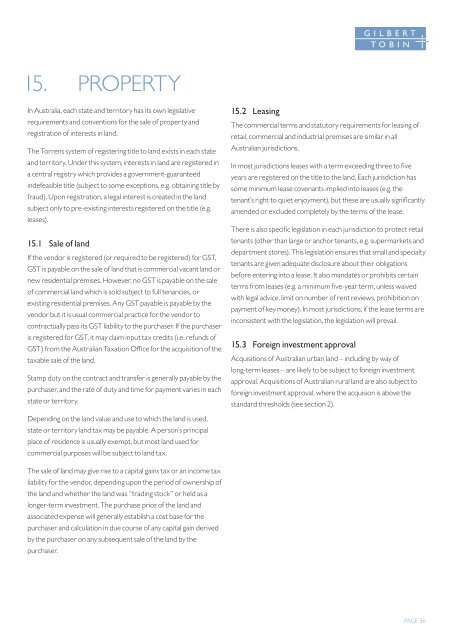Gilbert + tobin
Gilbert + tobin
Gilbert + tobin
- No tags were found...
You also want an ePaper? Increase the reach of your titles
YUMPU automatically turns print PDFs into web optimized ePapers that Google loves.
15. PropertyIn Australia, each state and territory has its own legislativerequirements and conventions for the sale of property andregistration of interests in land.The Torrens system of registering title to land exists in each stateand territory. Under this system, interests in land are registered ina central registry which provides a government-guaranteedindefeasible title (subject to some exceptions, e.g. obtaining title byfraud). Upon registration, a legal interest is created in the landsubject only to pre-existing interests registered on the title (e.g.leases).15.1 Sale of landIf the vendor is registered (or required to be registered) for GST,GST is payable on the sale of land that is commercial vacant land ornew residential premises. However, no GST is payable on the saleof commercial land which is sold subject to full tenancies, orexisting residential premises. Any GST payable is payable by thevendor but it is usual commercial practice for the vendor tocontractually pass its GST liability to the purchaser. If the purchaseris registered for GST, it may claim input tax credits (i.e. refunds ofGST) from the Australian Taxation Office for the acquisition of thetaxable sale of the land.Stamp duty on the contract and transfer is generally payable by thepurchaser, and the rate of duty and time for payment varies in eachstate or territory.15.2 LeasingThe commercial terms and statutory requirements for leasing ofretail, commercial and industrial premises are similar in allAustralian jurisdictions.In most jurisdictions leases with a term exceeding three to fiveyears are registered on the title to the land. Each jurisdiction hassome minimum lease covenants implied into leases (e.g. thetenant’s right to quiet enjoyment), but these are usually significantlyamended or excluded completely by the terms of the lease.There is also specific legislation in each jurisdiction to protect retailtenants (other than large or anchor tenants, e.g. supermarkets anddepartment stores). This legislation ensures that small and specialtytenants are given adequate disclosure about their obligationsbefore entering into a lease. It also mandates or prohibits certainterms from leases (e.g. a minimum five-year term, unless waivedwith legal advice, limit on number of rent reviews, prohibition onpayment of key money). In most jurisdictions, if the lease terms areinconsistent with the legislation, the legislation will prevail.15.3 Foreign investment approvalAcquisitions of Australian urban land – including by way oflong-term leases – are likely to be subject to foreign investmentapproval. Acquisitions of Australian rural land are also subject toforeign investment approval, where the acquision is above thestandard thresholds (see section 2).Depending on the land value and use to which the land is used,state or territory land tax may be payable. A person’s principalplace of residence is usually exempt, but most land used forcommercial purposes will be subject to land tax.The sale of land may give rise to a capital gains tax or an income taxliability for the vendor, depending upon the period of ownership ofthe land and whether the land was “trading stock” or held as alonger-term investment. The purchase price of the land andassociated expense will generally establish a cost base for thepurchaser and calculation in due course of any capital gain derivedby the purchaser on any subsequent sale of the land by thepurchaser.PAGE 36







